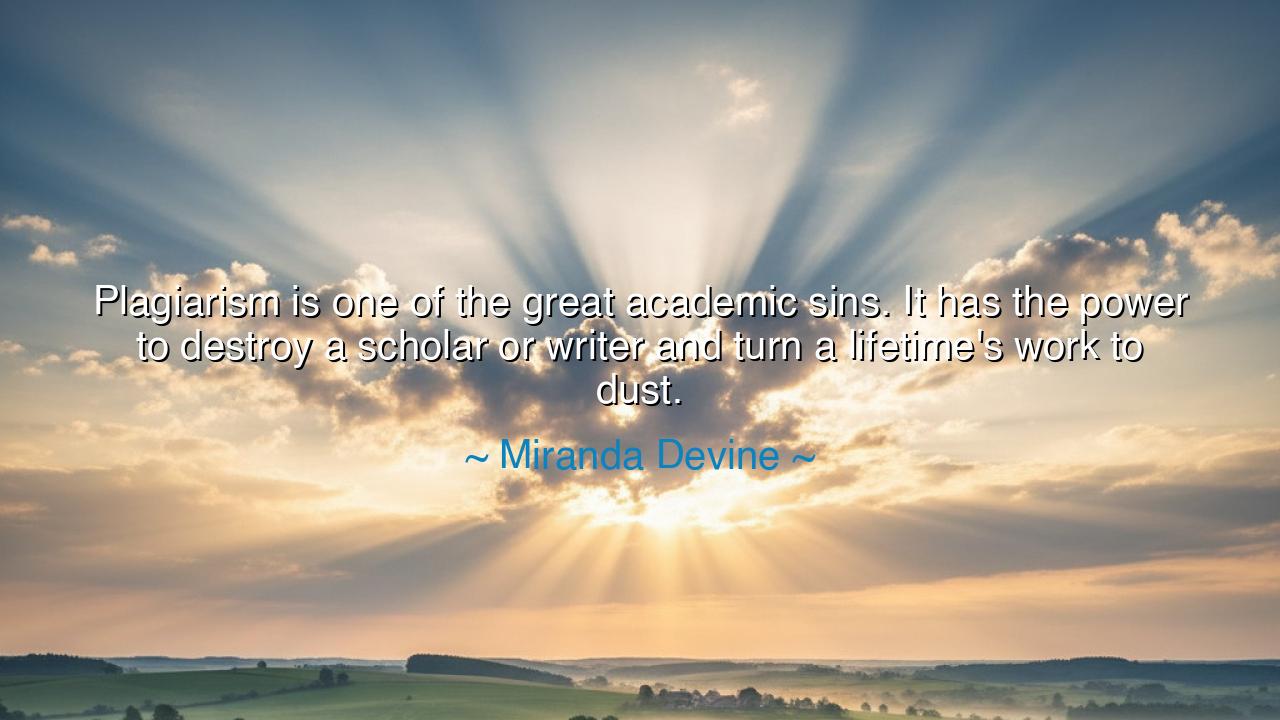
Plagiarism is one of the great academic sins. It has the power to
Plagiarism is one of the great academic sins. It has the power to destroy a scholar or writer and turn a lifetime's work to dust.






“Plagiarism is one of the great academic sins. It has the power to destroy a scholar or writer and turn a lifetime’s work to dust.” Thus declared Miranda Devine, the journalist and thinker, whose warning resounds through the halls of learning like a stern voice of truth. Her words carry the weight of centuries, for they speak not only of the crime of imitation, but of the sacredness of originality—the divine spark that makes human thought both noble and eternal. To steal another’s words, she reminds us, is not a trivial error, but a desecration of trust, a betrayal of the very soul of knowledge.
In this saying lies the recognition that creation is holy. Every true act of writing, every idea born from honest toil, is a fragment of the creator’s spirit, a labor of mind and heart. When one plagiarizes, one commits a theft not merely of sentences but of identity. It is the robbing of another’s inner light and claiming it as one’s own. And though the act may at first go unnoticed, the stain it leaves is indelible, for truth, patient though it may be, will one day unveil every deception. Thus, Devine’s words are not a warning of punishment from others, but of the inner collapse that comes when a person trades integrity for applause.
To call plagiarism a sin is to recognize it as a violation of the moral order that governs both art and intellect. Just as ancient temples were defiled when their idols were stolen, so too is the temple of scholarship corrupted when words are taken without honor. Knowledge thrives on the exchange of ideas—but that exchange demands honesty. To learn from another is noble; to imitate without acknowledgment is to shatter the sacred covenant between teacher and student, between writer and reader, between the mind and the truth it seeks to serve.
History itself bears witness to the ruin Devine describes. Consider the tale of Thomas Chatterton, the gifted youth of eighteenth-century England, who forged medieval poems and passed them off as ancient works. For a time, he was celebrated as a prodigy, his fame rising like the morning sun. But when the truth was uncovered, his reputation crumbled, and despair consumed him. His genius, once bright with promise, was eclipsed by the shadow of deceit. The world did not merely condemn his forgery—it pitied the waste of a brilliant mind that chose imitation over authenticity. His fate stands as a monument to Devine’s warning: plagiarism turns a lifetime’s work to dust.
But there are also those whose reverence for truth has preserved their names across ages. Leonardo da Vinci, though surrounded by imitators, refused to copy even his own sketches, choosing instead to labor endlessly toward perfection. His journals overflowed with original insight, and though centuries have passed, the authenticity of his genius remains untouched. He stands as proof that originality endures, while stolen work withers in the light of time. Those who honor truth become eternal; those who betray it are forgotten, their names erased like chalk from the blackboard of history.
The origin of Devine’s insight lies in the understanding that creativity is a form of moral discipline. To think, to write, to compose—these are acts of courage, for they require one to face the void and bring forth something that has never existed before. Plagiarism is the refusal of that courage; it is the shortcut of the fearful. It tempts the weak with the illusion of success while robbing them of the one thing that gives success its worth—authenticity. Every stolen word is a confession of insecurity, a silent admission that one has lost faith in one’s own voice.
The lesson, then, is clear and enduring: guard the sanctity of your mind. Let your thoughts be your own, however small they may seem, for truth, even in its humblest form, carries more power than imitation in its grandest disguise. If you must draw from others, do so with gratitude, not greed. Acknowledge your teachers, honor your influences, and weave their wisdom into your own tapestry without stealing the thread. For only through honesty does the mind ascend; deception binds it forever to the dust.
So, my child, when you sit before the blank page, remember Miranda Devine’s words. Do not fear the struggle to be original—it is the labor that refines the soul. Let your ideas come slowly, but let them be yours. Better a single true line born from your heart than a thousand borrowed words written in disguise. For the world has no need of echoes—it hungers for voices. And when your work is honest, it will stand like stone against the winds of time, while those built on deceit will crumble into ashes, carried away by the breath of truth.






AAdministratorAdministrator
Welcome, honored guests. Please leave a comment, we will respond soon